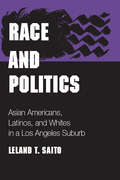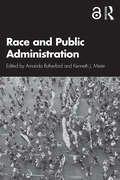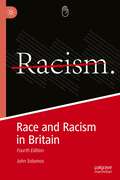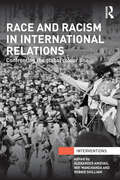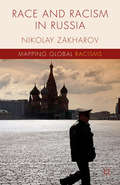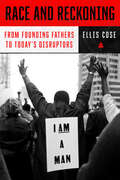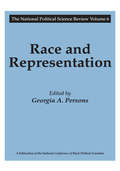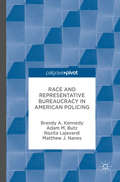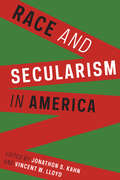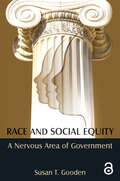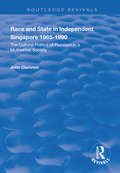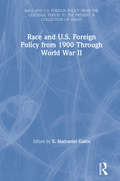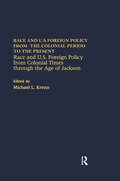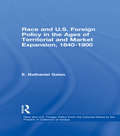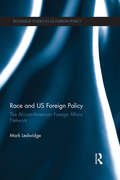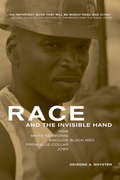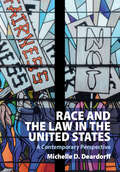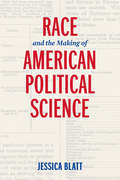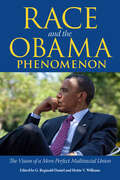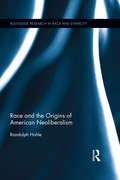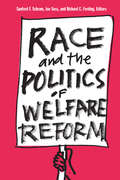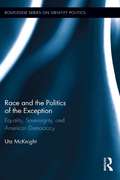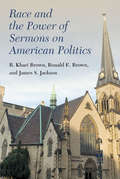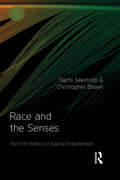- Table View
- List View
Race and Politics: Asian Americans, Latinos, and Whites in a Los Angeles Suburb (Asian American Experience)
by Leland T. SaitoLocated a mere fifteen minutes from Los Angeles, the San Gabriel Valley is an incubator for California's new ethnic politics. Here, Latinos and Asian Americans are the dominant groups. Politics are Latino-dominated, while a large infusion of Chinese immigrants and capital has made the San Gabriel Valley the center of the nation's largest Chinese ethnic economy. The white population, meanwhile, has dropped from an overwhelming majority in 1970 to a minority in 1990. Leland T. Saito presents an insider's view of the political, economic, and cultural implications of this ethnic mix. He examines how diverse residents of the region have worked to overcome their initial antagonisms and develop new, more effective political alliances. Tracing grassroots political organization along racial and ethnic lines, Race and Politics focuses on the construction of new identities in general and the panethnic affiliation "Asian American" in particular.
Race and Public Administration
by Amanda Rutherford; Kenneth J. MeierIssues of race permeate virtually every corner of policy creation and implementation in the United States, yet theoretically driven research on interactions of policy, race, and ethnicity rarely offers practical tools that can be readily applied by current and future civil servants, private contractors, or nonprofit boards. Arguing that scholarship can and should inform practice to address issues of equity in public affairs, rather than overlook, ignore, or deny them, Race and Public Administration offers a much-needed and accessible exploration of current and cutting-edge research on race and policy. This book evaluates what contradictions, unanswered questions, and best (or worst) practices exist in conducting and understanding research that can provide evidence-based policy and management guidance to practitioners in the field. Individual chapters are written by established and emerging scholars and explore a wide range of policy areas, including public education, policing, health and access to healthcare, digital governance, nonprofit diversity, and international contexts. Together, the chapters serve as a link between theoretically informed research in public administration and those students and professionals trained to work in the trenches of public administration. This book is ideally suited as a text for courses in schools of public administration, public policy, or nonprofit management, and is required reading for those actively involved in policy analysis, creation, or evaluation.
Race and Racism in Britain: Fourth Edition
by John SolomosThis Fourth Edition of a pioneering handbook provides a critical analysis of the origins and evolution of political and policy debates regarding race and racism in British society. Drawing on a broad range of both theoretical and historical research, the focus of the book is on the development of policies and debates in the period from the second half of the 20th Century to the present. The book is organized into twelve chapters which provide an overview of key trends, situating the development of policies and developments in relation to immigration and citizenship, race relations policies and broader agendas about multiculturalism and living with difference. In the substantive chapters of the book there is also a detailed discussion of such issues as policing, urban unrest and protest, racist politics, black and ethnic minority politics and conversations about multiculturalism. This new edition engages with both the historical background as well as contemporary developments to provide a novel and wide-ranging account of the role that questions about race and racism play in British society.
Race and Racism in International Relations: Confronting the Global Colour Line (Interventions)
by Alexander Anievas Robbie Shilliam Nivi ManchandaInternational Relations, as a discipline, does not grant race and racism explanatory agency in its conventional analyses, despite such issues being integral to the birth of the discipline. Race and Racism in International Relations seeks to remedy this oversight by acting as a catalyst for remembering, exposing and critically re-articulating the central importance of race and racism in International Relations. Focusing especially on the theoretical and political legacy of W.E.B. Du Bois’s concept of the "colour line", the cutting edge contributions in this text provide an accessible entry point for both International Relations students and scholars into the literature and debates on race and racism by borrowing insights from disciplines such as history, anthropology and sociology where race and race theory figures more prominently; yet they also suggest that the field of IR is itself an intellectually and strategic field through which to further confront the global colour line. Drawing together a wide range of contributors, this much-needed text will be essential reading for students and scholars in a range of areas including Postcolonial studies, race/racism in world politics and international relations theory.
Race and Racism in Russia
by Nikolay ZakharovRace and Racism in Russia identifies the striking changes in racial ideas, practices, exclusions and violence in Russia since the 1990s, revealing how 'Russianness' has become a synonym for racial whiteness. This ground-breaking book provides new theories and substantive insights into race and ethnicity in a Russian context.
Race and Reckoning: From Founding Fathers to Today's Disruptors
by Ellis CoseRanging from chattel slavery, through the New Deal to the Covid pandemic, a groundbreaking work that investigates how pivotal decisions have established and perpetuated discriminatory practices, even as the rise of disinformation and other modern advertising techniques have plunged democracy into an ever-deepening crisis. Throughout our nation’s history, numerous racialized decisions have solidified the fates of generations of citizens of color. Some of the earliest involved race-based slavery, the removal of Indigenous peoples from their lands, and the exclusion of most Asians. More have proliferated over time. While America grew into a superpower in the twentieth century, it continued to discriminate against people of color—both soldiers who served overseas and civilians on the home front, herding Japanese Americans into internment camps during World War II and denying Black citizens their right to vote. American Politicians have waxed eloquently and endlessly about bettering the nation. But bettering it for whom? journalist and cultural commentator Ellis Cose asks. From Reconstruction to the New Deal to the unceasing fight for civil rights, Cose reveals how the hopes of many Americans for a true multicultural democracy have been repeatedly frustrated by white nationalists skilled at weaponizing racial anxieties of other whites. In Race and Reckoning Cose dissects chapter-by-chapter how America’s overall narrative breeds racial resentment rooted in conjecture over fact. Through rigorous research and with astute detail, Cose uncovers how, at countless points in history, America’s leaders have upheld a narrative of American greatness rooted in racism, as he offers a hopeful yet clear-eyed vision of American possibility.It is a story grounded in history, and it demolishes the myths that ultimately allowed one of the most ill-prepared, unethical, vindictive, and truth-challenged politicians in history to position himself as America’s savior by tapping into the nation’s darkest tendencies. A "pointed rebuke of American exceptionalism,” was Publishers Weekly's description of Race and Reckoning. Whereas many politicians argue for ignoring or rewriting unflattering history, this is a passionate and incisive argument for accepting—and learning from—historical truth and rejecting ignorance disguised as patriotism. An important work “that merits a place on ethnic studies—and American history—curricula,” observed Kirkus.
Race and Representation: Volume 1, Race And Representation In American Politics (National Political Science Review Ser. #Vol. 6)
by Editor Georgia A. PersonsThe National Political Science Review is the official publication of the National Conference of Black Political Scientists. This series, now entering its sixth volume, includes significant scholarly research reflecting the diverse interests of scholars from various backgrounds who use different models, approaches, and methodologies. The central focus is on politics and policies that advantage or disadvantage groups because of race, ethnicity, gender, and other major variables.Race and Representation is anchored by a symposium that focuses on efforts to enhance representation of African Americans in legislative bodies under the authority of the historic Voting Rights Act of 1965, and on recent court challenges to the constitutionality of redistricting plans drawn under that act. The chapters constitute an extension of an ongoing and protracted, highly charged, public debate. In her introduction, Georgia A. Persons discusses how recent Supreme Court rulings, such as in Shaw v. Reno, Miller v. Johnson, and Bush v. Vera, have significantly redefined the meaning and permissible parameters of the Voting Rights Act. She affirms that they have also strongly posited, albeit somewhat indirectly, a legal meaning of representation that is at variance with the more broadly philosophical meaning of representation grounded in the ideal of enhancing equality among different groups in a society.The articles in Race and Representation are refreshingly informative. They include case studies written by political scientists who became involved directly with events surrounding the theme of this volume. A new section, 'Reflections,' is introduced; it will be reserved for commentary and analysis of an issue that captures the political spirit of the times. In the inaugural contribution, J. Owens Smith reflects on the assault on liberal philosophy as a foundation for civil rights claims and offers an alternative philosophical prism for viewing and justifying such claims. This volume is essen
Race and Representative Bureaucracy in American Policing
by Brandy A. Kennedy Adam M. Butz Nazita Lajevardi Matthew J. NanesThis book examines issues of race and policing through the lens of representative bureaucracy theory. According to representative bureaucracy theory, demographic correspondence between government employees and the local population can lead to more favorable outcomes for minority groups. It argues that police forces with higher minority composition will have more positive outcomes across measures such as fewer excessive force complaints and fewer fatal encounters with officers. Additionally, the book asserts that more representative forces will demonstrate responsiveness and accountability by implementing policies such as citizen review boards for excessive force complaints. It does this by first providing a brief overview of issues surrounding race and policing in America, documenting racial representation occurring in local police forces nationwide, and exploring the potential causes and consequences of underrepresentation. It concludes by discussing the implications of our findings and offer potential policy remedies and solutions that local law enforcements can pursue in order to reduce minority underrepresentation and improve policing outcomes.
Race and Secularism in America
by Vincent W. Lloyd Jonathan KahnThis anthology draws bold comparisons between secularist strategies to contain, privatize, and discipline religion and the treatment of racialized subjects by the American state. Specializing in history, literature, anthropology, theology, religious studies, and political theory, contributors expose secularism's prohibitive practices in all facets of American society and suggest opportunities for change.
Race and Secularism in America (Religion, Culture, and Public Life #30)
by Vincent W. Lloyd Jonathon S. KahnThis anthology draws bold comparisons between secularist strategies to contain, privatize, and discipline religion and the treatment of racialized subjects by the American state. Specializing in history, literature, anthropology, theology, religious studies, and political theory, contributors expose secularism's prohibitive practices in all facets of American society and suggest opportunities for change.
Race and Social Equity: A Nervous Area of Government
by Susan T GoodenIn this compelling book the author contends that social equity--specifically racial equity--is a nervous area of government. Over the course of history, this nervousness has stifled many individuals and organizations, thus leading to an inability to seriously advance the reduction of racial inequities in government. The author asserts that until this nervousness is effectively managed, public administration social equity efforts designed to reduce racial inequities cannot realize their full potential.
Race and State in Independent Singapore 1965–1990: The Cultural Politics of Pluralism in a Multiethnic Society (Routledge Revivals)
by John ClammerFirst published in 1998, this volume explores Singapore as an ideal case study for the examination of the management of postcoloniality, social diversity and the pursuit of economic growth with ethnic harmony. Singapore has, since independence, evolved a unique mix of state directed capitalism, revamped Confucianism and a social order based on an ideology of multiracialism. The result has been a State with enormous sociological diversity held together by the need to create a unified political order out of a population of immigrants of very diverse origins. This has placed the management of multiethnicity at the heart of political discourse and social policy. This book examines critically the operation of ethnicity in post-independence Singapore, the social policies that have been evolved to manage it, and the implications of the Singapore experiment for other plural societies in Asia and elsewhere.
Race and U.S. Foreign Policy from 1900 Through World War II
by Michael L. KrennExplores the concept of "race" The term "race," which originally denoted genealogical or class identity, has in the comparatively brief span of 300 years taken on an entirely new meaning. In the wake of the Enlightenment it came to be applied to social groups. This ideological transformation coupled with a dogmatic insistence that the groups so designated were natural, and not socially created, gave birth to the modern notion of "races" as genetically distinct entities. The results of this view were the encoding of "race" and "racial" hierarchies in law, literature, and culture. How "racial" categories facilitate social control The articles in the series demonstrate that the classification of humans according to selected physical characteristics was an arbitrary decision that was not based on valid scientific method. They also examine the impact of colonialism on the propagation of the concept and note that "racial" categorization is a powerful social force that is often used to promote the interests of dominant social groups. Finally, the collection surveys how laws based on "race" have been enacted around the world to deny power to minority groups. A multidisciplinary resourceThis collection of outstanding articles brings multiple perspectives to bear on race theory and draws on a wider ranger of periodicals than even the largest library usually holds. Even if all the articles were available on campus, chances are that a student would have to track them down in several libraries and microfilm collections. Providing, of course, that no journals were reserved for graduate students, out for binding, or simply missing. This convenient set saves students substantial time and effort by making available all the key articles in one reliable source. Authoritative commentaryThe series editor has put together a balanced selection of the most significant works, accompanied by expert commentary. A general introduction gives important background information and outlines fundamental issues, current scholarship, and scholarly controversies. Introductions to individual volumes put the articles in context and draw attention to germinal ideas and major shifts in the field. After reading the material, even a beginning student will have an excellent grasp of the basics of the subject.
Race and U.S. Foreign Policy from Colonial Times Through the Age of Jackson (Race And U. S. Foreign Policy From The Colonial Period To The Present: A Collection Of Essays Ser.)
by Michael L. KrennFirst published in 1998. Explores the concept of "race" - The term "race," which originally denoted genealogical or class identity, has in the comparatively brief span of 300 years taken on an entirely new meaning. In the wake of the Enlightenment it came to be applied to social groups. This ideological transformation coupled with a dogmatic insistence that the groups so designated were natural, and not socially created, gave birth to the modern notion of "races" as genetically distinct entities. The results of this view were the encoding of "race" and "racial" hierarchies in law, literature, and culture. How "racial" categories facilitate social control - The articles in the series demonstrate that the classification of humans according to selected physical characteristics was an arbitrary decision that was not based on valid scientific method. They also examine the impact of colonialism on the propagation of the concept and note that "racial" categorization is a powerful social force that is often used to promote the interests of dominant social groups. Finally, the collection surveys how laws based on "race" have been enacted around the world to deny power to minority groups. A multidisciplinary resource- This collection of outstanding articles brings multiple perspectives to bear on race theory and draws on a wider ranger of periodicals than even the largest library usually holds. Even if all the articles were available on campus, chances are that a student would have to track them down in several libraries and microfilm collections. Providing, of course, that no journals were reserved for graduate students, out for binding, or simply missing. This convenient set saves students substantial time and effort by making available all the key articles in one reliable source.
Race and U.S. Foreign Policy in the Ages of Territorial and Market Expansion, 1840-1900 (Race and U.S. Foreign Policy From the Colonial Period to the Present: A Collection of Essays)
by Michael L. KrennFirst Published in 1998. Routledge is an imprint of Taylor & Francis, an informa company.
Race and US Foreign Policy: The African-American Foreign Affairs Network (Routledge Studies in US Foreign Policy)
by Mark LedwidgeAfrican-Americans' analysis of, and interest in, foreign affairs represents a rich and dynamic legacy, and this work provides a cutting edge insight into this neglected aspect of US foreign affairs. In addition to extending the parameters of US foreign policy literature to include race and ethnicity, the book documents case-specific analyses of the evolutionary development of the African American foreign affairs network (AAFAN). Whilst the examination of race in regard to the construction of US foreign policy is significant, this book also provides a cross disciplinary approach which utilises historical and political science methods to paint a more realistic appraisal of US foreign policy. Including analysis of original archival evidence, this theoretically informed work seeks to transcend the standard mono-disciplinary approach which overestimates the separation between domestic and foreign affairs. The unique approach of this work will add an important dimension to a newly emerging field and will be of interest to scholars in ethnic and racial studies, American politics, US foreign policy and US history.
Race and the Invisible Hand
by Stephen Steinberg Deirdre A. RoysterFrom the time of Booker T. Washington to today, and William Julius Wilson, the advice dispensed to young black men has invariably been, "Get a trade." Deirdre Royster has put this folk wisdom to an empirical test--and, in Race and the Invisible Hand, exposes the subtleties and discrepancies of a workplace that favors the white job-seeker over the black. At the heart of this study is the question: Is there something about young black men that makes them less desirable as workers than their white peers? And if not, then why do black men trail white men in earnings and employment rates? Royster seeks an answer in the experiences of 25 black and 25 white men who graduated from the same vocational school and sought jobs in the same blue-collar labor market in the early 1990s. After seriously examining the educational performances, work ethics, and values of the black men for unique deficiencies, her study reveals the greatest difference between young black and white men--access to the kinds of contacts that really help in the job search and entry process.
Race and the Law in the United States: A Contemporary Perspective
by Michelle D. DeardorffThis text explores how the legal history and judicial decisions of the United States contribute to the dynamic societal debates Americans are having around race today. It pairs historical cases and primary sources with contextual commentary to ensure students comprehend how decisions from the past deeply impact the laws they have inherited, as well as shape contemporary issues and political movements. This framework also highlights the distinctive characteristics of the various time periods and how they connect to other eras to provide students with a full appreciation of the events and environments influencing cases. Written in an accessible and engaging style, it avoids the traditional focus of many caselaw books and instead promotes a sound understanding of the legal concepts and dynamics that inform current discussions of racial identities, challenging the usual development of doctrinal law and court decisions defining race. An Instructor Manual is available online, with additional teaching resources and assessment materials for each chapter, to foster meaningful class discussions about future choices and how to pursue a more equal nation.
Race and the Making of American Political Science (American Governance: Politics, Policy, and Public Law)
by Jessica BlattRace and the Making of American Political Science shows that changing scientific ideas about racial difference were central to the academic study of politics as it emerged in the United States. From the late nineteenth century through the 1930s, scholars of politics defined and continually reoriented their field in response to the political imperatives of the racial order at home and abroad as well to as the vagaries of race science.The Gilded Age scholars who founded the first university departments and journals located sovereignty and legitimacy in a "Teutonic germ" of liberty planted in the new world by Anglo-Saxon settlers and almost extinguished in the conflict over slavery. Within a generation, "Teutonism" would come to seem like philosophical speculation, but well into the twentieth century, major political scientists understood racial difference to be a fundamental shaper of political life. They wove popular and scientific ideas about race into their accounts of political belonging, of progress and change, of proper hierarchy, and of democracy and its warrants. And they attended closely to new developments in race science, viewing them as central to their own core questions. In doing so, they constructed models of human difference and political life that still exert a powerful hold on our political imagination today, in and outside of the academy.By tracing this history, Jessica Blatt effects a bold reinterpretation of the origins of U.S. political science, one that embeds that history in larger processes of the coproduction of racial ideas, racial oppression, and political knowledge.
Race and the Obama Phenomenon: The Vision of a More Perfect Multiracial Union
by G. Reginald Daniel and Hettie V. WilliamsThe concept of a more perfect union remains a constant theme in the political rhetoric of Barack Obama. From his now historic race speech to his second victory speech delivered on November 7, 2012, that striving is evident. “Tonight, more than two hundred years after a former colony won the right to determine its own destiny, the task of perfecting our union moves forward,” stated the forty-fourth president of the United States upon securing a second term in office after a hard-fought political contest. Obama borrows this rhetoric from the founding documents of the United States set forth in the US Constitution and in Abraham Lincoln's “Gettysburg Address.” How naive or realistic is Obama's vision of a more perfect American union that brings together people across racial, class, and political lines? How can this vision of a more inclusive America be realized in a society that remains racist at its core? These essays seek answers to these complicated questions by examining the 2008 and 2012 elections as well as the events of President Obama's first term. Written by preeminent race scholars from multiple disciplines, the volume brings together competing perspectives on race, gender, and the historic significance of Obama's election and reelection. The president heralded in his November 2012, acceptance speech, “The idea that if you're willing to work hard, it doesn't matter who you are, or where you come from, or what you look like . . . . whether you're black or white, Hispanic or Asian or Native American.” These essayists argue the truth of that statement and assess whether America has made any progress toward that vision.
Race and the Origins of American Neoliberalism (Routledge Research in Race and Ethnicity #12)
by Randolph HohleWhy did the United States forsake its support for public works projects, public schools, public spaces, and high corporate taxes for the neoliberal project that uses the state to benefit businesses at the expense of citizens? The short answer to this question is race. This book argues that the white response to the black civil rights movement in the 1950s, '60s, and early '70s inadvertently created the conditions for emergence of American neoliberalism. Neoliberalism is the result of an unlikely alliance of an elite liberal business class and local segregationists that sought to preserve white privilege in the civil rights era. The white response drew from a language of neoliberalism, as they turned inward to redefine what it meant to be a good white citizen. The language of neoliberalism depoliticized class tensions by getting whites to identify as white first, and as part of a social class second. This book explores the four pillars of neoliberal policy, austerity, privatization, deregulation, and tax cuts, and explains how race created the pretext for the activation of neoliberal policy. Neoliberalism is not about free markets. It is about controlling the state to protect elite white economic privileges.
Race and the Politics of Welfare Reform
by Sanford Schram Joe Soss Richard C. FordingIt's hard to imagine discussing welfare policy without discussing race, yet all too often this uncomfortable factor is avoided or simply ignored. Sometimes the relationship between welfare and race is treated as so self-evident as to need no further attention; equally often, race in the context of welfare is glossed over, lest it raise hard questions about racism in American society as a whole. Either way, ducking the issue misrepresents the facts and misleads the public and policy-makers alike. Many scholars have addressed specific aspects of this subject, but until now there has been no single integrated overview. Race and the Politics of Welfare Reform is designed to fill this need and provide a forum for a range of voices and perspectives that reaffirm the key role race has played--and continues to play--in our approach to poverty. The essays collected here offer a systematic, step-by-step approach to the issue. Part 1 traces the evolution of welfare from the 1930s to the sweeping Clinton-era reforms, providing a historical context within which to consider today's attitudes and strategies. Part 2 looks at media representation and public perception, observing, for instance, that although blacks accounted for only about one-third of America's poor from 1967 to 1992, they featured in nearly two-thirds of news stories on poverty, a bias inevitably reflected in public attitudes. Part 3 discusses public discourse, asking questions like "Whose voices get heard and why?" and "What does 'race' mean to different constituencies?" For although "old-fashioned" racism has been replaced by euphemism, many of the same underlying prejudices still drive welfare debates--and indeed are all the more pernicious for being unspoken. Part 4 examines policy choices and implementation, showing how even the best-intentioned reform often simply displaces institutional inequities to the individual level--bias exercised case by case but no less discriminatory in effect. Part 5 explores the effects of welfare reform and the implications of transferring policy-making to the states, where local politics and increasing use of referendum balloting introduce new, often unpredictable concerns. Finally, Frances Fox Piven's concluding commentary, "Why Welfare Is Racist," offers a provocative response to the views expressed in the pages that have gone before--intended not as a "last word" but rather as the opening argument in an ongoing, necessary, and newly envisioned national debate.
Race and the Politics of the Exception: Equality, Sovereignty, and American Democracy (Routledge Series on Identity Politics)
by Utz McKnightThe traditional assumption today about race is that it is not political; that it has no political content and is a matter of individual beliefs and attitudes. In Race and the Politics of the Exception, Utz McKnight argues that race is in fact political and defines how it functions as a politics in the United States. McKnight organizes his book into three sections, beginning with a theoretical section about racial politics in the United States. Using theorists such as Benjamin, Agamben, and Schmitt, McKnight discusses how the idea of racial communities went from being constituted through the idea of racial sovereignty and a politics of the exception that defined blacks as the internal enemy, to being constitutionally defined through the institutions of racial equal opportunity. In the second section, McKnight further develops his critical race theory by exploring in more detail the social use of race today. The election of President Obama has brought the politics of racial equality to a critical point. In spite of a very powerful set of political tools to define it as a thing of the past, race matters. In the final section, McKnight engages with important African American fiction from each of the three major periods of racial politics in the US. Earlier descriptions of political theory are used throughout these analyses to refine the argument for a new critical politics of race. Scholars of political theory, identity politics, African American studies, and American Studies will find this work ground-breaking and relevant.
Race and the Power of Sermons on American Politics
by James Jackson R. Khari Brown Ronald E BrownThis book examines the intersection of race, political sermons, and social justice. Religious leaders and congregants who discuss and encourage others to do social justice embrace a form of civil religion that falls close to the covenantal wing of American civil religious thought. Clergy and members who share this theological outlook frame the nation as being exceptional in God’s sight. They also emphasize that the nation’s special relationship with the Creator is contingent on the nation working toward providing opportunities for socioeconomic well-being, freedom, and creative pursuits. God’s covenant, thus, requires inclusion of people who may have different life experiences but who, nonetheless, are equally valued by God and worthy of dignity. Adherents to such a civil religious worldview would believe it right to care for and be in solidarity with the poor and powerless, even if they are undocumented immigrants, people living in non-democratic and non-capitalist nations, or members of racial or cultural out-groups. Relying on 44 national and regional surveys conducted between 1941 and 2019, Race and the Power of Sermons on American Politics explores how racial experiences impact the degree to which religion informs social justice attitudes and political behavior. This is the most comprehensive set of analyses of publicly available survey data on this topic.
Race and the Senses: The Felt Politics of Racial Embodiment (Sensory Studies)
by Christopher Brown Sachi SekimotoIn Race and the Senses, Sachi Sekimoto and Christopher Brown explore the sensorial and phenomenological materiality of race as it is felt and sensed by the racialized subjects. Situating the lived body as an active, affective, and sensing participant in racialized realities, they argue that race is not simply marked on our bodies, but rather felt and registered through our senses. They illuminate the sensorial landscape of racialized world by combining the scholarship in sensory studies, phenomenology, and intercultural communication. Each chapter elaborates on the felt bodily sensations of race, racism, and racialization that illuminate how somatic labor plays a significant role in the construction of racialized relations of sensing. Their thought-provoking theorizing about the relationship between race and the senses include race as a sensory assemblage, the phenomenology of the racialized face and tongue, kinesthetic feelings of blackness, as well as the possibility of cross-racial empathy. Race is not merely socially constructed, but multisensorially assembled, engaged, and experienced. Grounded in the authors’ experiences, one as a Japanese woman living in the USA, and the other as an African American man from Chicago, Race and the Senses is a book about how we feel the racialized world into being.
